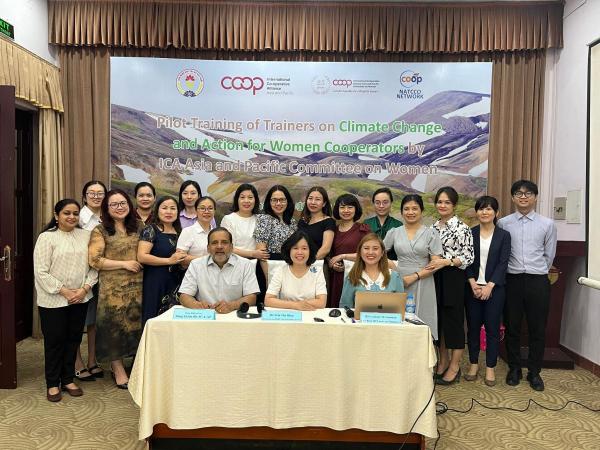
The ICA-AP Committee on Women organized a pilot training of trainers on climate change and action for women cooperators in Hanoi, Vietnam from 17-19 May 2023. The training was conducted in partnership with the Vietnam Cooperative Alliance (VCA) and the National Confederation of Cooperatives (NATCCO). The training was supported by the Japanese Consumers’ Cooperative Union (JCCU).
In 2022, ICA-AP Committee on Women decided to focus on climate change as a priority area to build the capacity of women cooperators in Asia and Pacific. The Committee partnered with NATCCO to develop a customized training manual which is used as an important knowledge tool to conduct the training.
The pilot training was held in Vietnam to test the draft manual and training methodology. The training was attended by 12 women from 12 provinces, representing different Provincial Cooperative Alliances (PCAs) under VCA. The trainees comprised of staff from PCAs whose role is to conduct training at the province level, provide consultancy and advisory services to local cooperatives, and policy-making.
The manual has five main modules, namely 1) Introduction to climate change; 2) Climate change and its consequences on women and cooperatives; 3) Climate change solutions and the role of cooperatives; 4) Measuring the impact of climate action solutions; and 5) Developing an action plan and communication plan for the climate action program.

Ms. Lasalette M. Gumbam, the resource person from NATCCO delivered the training, covering each module of the manual using a combination of theory and practical exercises. The pilot training was joined by the Acting Vice-Director from the International Department at VCA Ms. Tran Thu Hang, ICA-AP Regional Director Mr. Balasubramanian Iyer, ICA-AP staff and Committee Secretary Ms. Simren Singh, and JCCU staff Ms. Takako Tsuchiya.
In her welcome and opening remarks, Ms. Hang noted, “At present, climate change on earth has been happening more and more due to emissions from greenhouse gases leading to more severe climate change and causing extensive destruction. This is a global problem that requires the efforts of each country to respond as well as the close cooperation of the international community. Over the years, Vietnam is one of the countries most affected by climate change and has made many active response efforts. The cooperative sector is no exception in the current climate change process. Climate change becomes the biggest challenge to the living environment today as well as in the future. Gender equality, climate change and disaster risk reduction are closely linked. In Vietnam, women in cooperatives play an important role in climate change response and disaster risk reduction activities. Women not only play an important role in production and business activities, but they can also be a pioneer in reducing greenhouse gas emissions. However, the results of some studies in Vietnam show that: Women's participation still faces many barriers in terms of technology, capacity, tradition and finance in climate change response; women have more limited access to information and less opportunity to learn and grasp early response measures. Therefore, increasing women's participation and implementing policies is important. It is important to promote and create conditions for them to best promote their role in climate change adaptation through innovative products and business models.
As the oldest member of the Women's Committee since 2002, Ms. Hang also extended her warm wishes for its 25th anniversary via a special video message.
In his opening remarks, Mr. Balasubramanian Iyer noted that “Just like COVID-19, climate change is a global issue. When we meet each other, we always ask about the weather. In every country, the weather patterns are changing drastically. More and more people are complaining about extreme weather conditions – either it is too hot or too cold. We are also facing unseasonal weather conditions such as unseasonal rainfall. This severely affects the agriculture sector the most. These difficult challenges that we are now facing are a result of a long process and given that we are now indulging in further consumerism and contributing a lot of waste, etc. such challenges are only going to rise in the future. We need to take small steps from today so that we can see positive results in the long run. The training on climate change and action by the Women’s Committee is a step in that direction”. Mr. Iyer introduced ICA-AP to the participants and encouraged them to take an active part in the training. He also thanked VCA, NATCCO and JCCU for their valuable support and wished everyone a successful three-day training.
In the end, feedback from participants was collected on the modules and methodology. The participants stated that the manual is very comprehensive and useful. They suggested valuable feedback such as focusing on more case studies or country-based examples of different actions that are being taken by cooperatives so that the trainees can learn more about other countries and adopt suitable measures. Their feedback will be incorporated to further improve the manual.
In the closing ceremony, Ms. Hang thanked ICA-AP, NATCCO and JCCU for conducting a useful training program. She noted that the topic of the training is new for VCA and that they and women trainees learnt a lot. She also added that VCA would like to implement the program in their country and would integrate certain topics covered in the training as part of their regular trainings. It was also noted that VCA will make an action plan that will be executed through their Provincial Cooperative Alliances.
Based on the observation during the pilot training and feedback collected, the manual will be revised by the Women’s Committee and NATCCO. The manual is expected to be launched later in November during the statutory meeting of the Women’s Committee.



